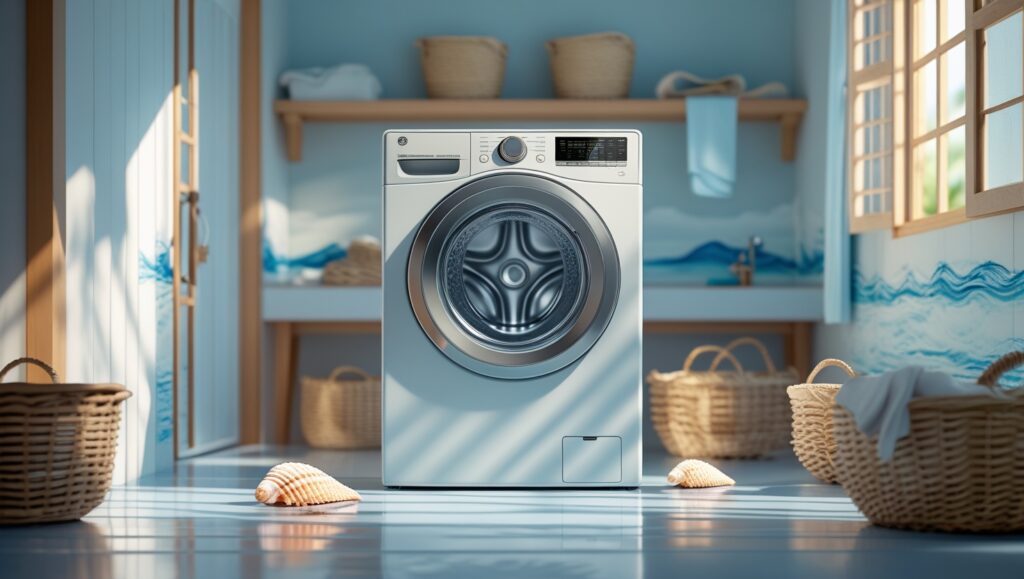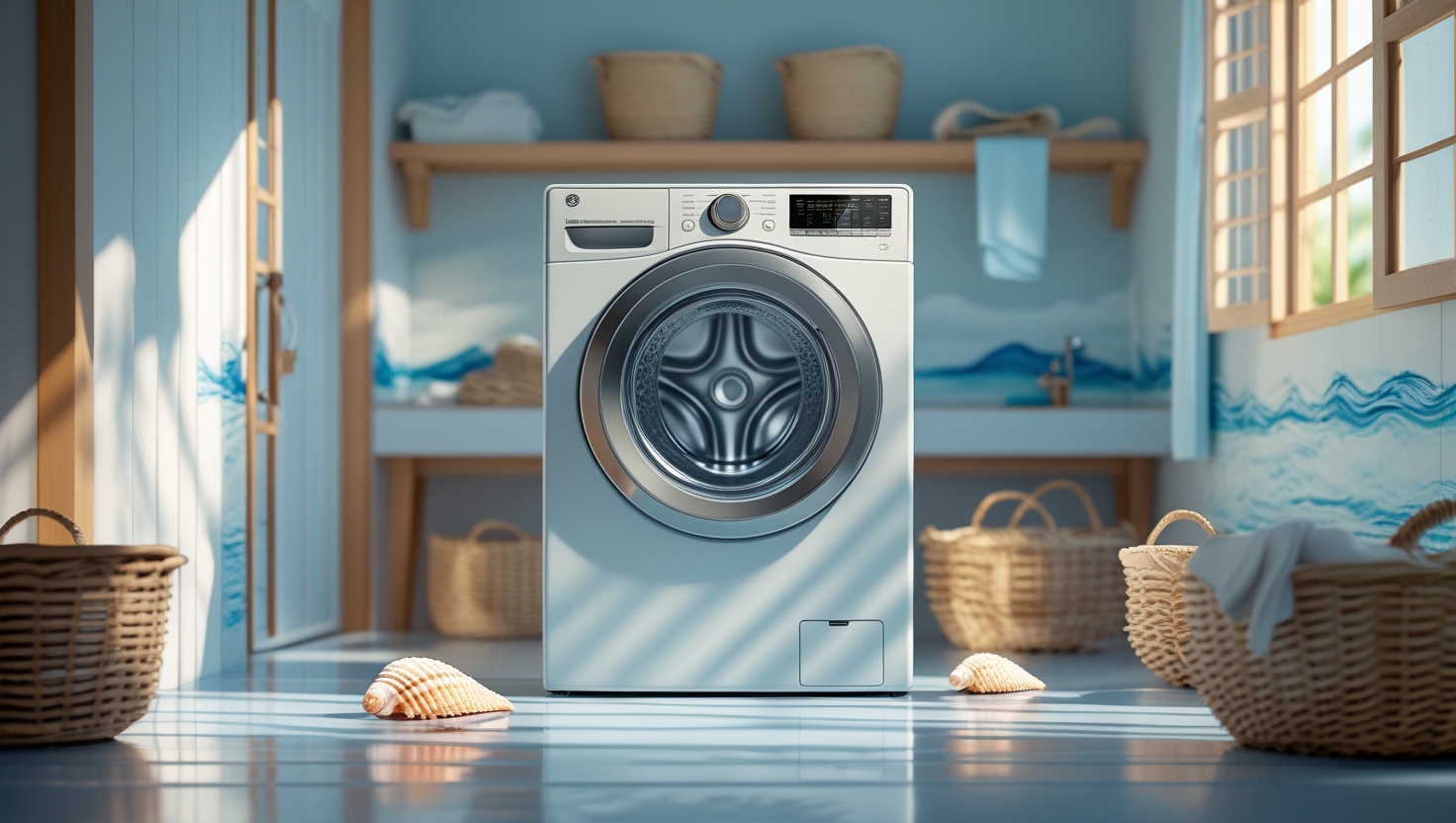Best Top Load Washers for Coastal Homes: Combatting Salt Air and Humidity
Living by the coast offers breathtaking views and a serene lifestyle, but it also brings unique challenges, especially when it comes to maintaining household appliances. The salty air and high humidity levels can accelerate corrosion, leading to premature wear and tear. For coastal homeowners, selecting a top load washer designed to withstand these conditions is crucial.

Table of Contents
Why Coastal Environments Demand Specialized Washers
Coastal areas are characterized by high humidity and salt-laden air, both of which can be detrimental to standard appliances. Salt particles can settle on metal surfaces, leading to rust and corrosion over time.
Humidity exacerbates this process, making it essential to choose washers with corrosion-resistant features. Additionally, the combination of salt and moisture can affect electronic components, leading to malfunctions.
Top Load Washers Built for Coastal Conditions
Here are some top load washers that combine durability with features tailored for coastal environments:
1. Equator Marine Washer EW 828
- Features:
- Designed specifically for marine and coastal use.
- Salt Wash cycle to remove salt residues from clothes.
- Anti-corrosion materials to withstand salty air.
- Why It’s Great: Tailored for coastal conditions, this washer ensures longevity and optimal performance in challenging environments.
2. Speed Queen TR7003WN
- Features:
- Commercial-grade components for enhanced durability.
- Stainless steel tub resists corrosion.
- Advanced suspension system for smooth operation.
- Why It’s Great: Known for its robust construction, this model is built to last, even in harsh coastal climates.
3. LG WT7900HBA 5.5 cu. ft. Mega Capacity Smart Top Load Washer
- Features:
- Stainless steel NeveRust™ drum.
- SmartThinQ® technology for remote operation.
- TurboWash3D™ for efficient cleaning.
- Why It’s Great: Combining advanced features with corrosion-resistant materials, this washer is both smart and sturdy.
Maintenance Tips for Coastal Homeowners
- Regular Cleaning: Wipe down the washer’s exterior with a damp cloth to remove salt deposits.
- Use Protective Coatings: Applying a thin layer of appliance-grade wax can provide an extra barrier against salt air.
- Ensure Proper Ventilation: Place the washer in a well-ventilated area to reduce humidity buildup.
- Routine Inspections: Check for signs of rust or corrosion regularly and address them promptly.
Final Thoughts
For coastal homeowners, investing in a top load washer designed to combat the challenges of salt air and humidity is essential. The models highlighted above offer a blend of durability, advanced features, and corrosion resistance, ensuring your laundry appliances stand the test of time in coastal conditions.
I’ve lived in a beach town for years, and trust me — salt air is no joke. It can eat through cheaper appliances like they’re nothing. That’s why choosing a washer built with corrosion-resistant materials isn’t optional — it’s necessary.
One of the most important features I look for in washers for coastal homes is a stainless steel tub. Not just because it looks clean and resists odors, but because it doesn’t rust like plastic or enamel-coated steel tends to over time.
Another huge plus? Sealed control panels. Salt and moisture can creep into buttons and electronics, so washers with sealed, waterproof interfaces last way longer and don’t glitch out after a humid summer.
For those who rent their beach properties, durability becomes even more important. You want something that can handle frequent use, various users, and still survive the climate. That’s why commercial-grade parts or marine-rated washers are worth the investment.
Humidity also means mold. That’s why I stick to top loaders — they dry out faster. Just leave the lid up when not in use and you’ll avoid that nasty musty smell that builds up in front-loaders, especially in damp environments.
If your laundry space is outside or in a shed, covering your washer with a breathable appliance cover can help extend its life. It keeps salty mist from settling and protects the top panel from sun and rain.
Another tip: use a dehumidifier or fan in your laundry area. It keeps the space dry and reduces how much moisture your washer has to deal with daily. Less moisture = less corrosion.
I also suggest running a monthly cleaning cycle, even if you’re not using the washer that often. Salt can still collect inside the tub or pump. Use an eco-friendly washer cleaner or run a hot cycle with vinegar and baking soda.
Look for washers that come with longer manufacturer warranties, especially those that mention corrosion protection or rust-proof parts. Some companies even offer extended protection for coastal zones.
Washers with adjustable legs and sturdy frames are better suited for uneven floors or concrete pads often found in beach house laundry areas. They handle vibration better and last longer when the surface isn’t perfect.
Water softening is another concern. Salt air doesn’t just attack metal — it can alter your water quality too. If you notice mineral build-up, pairing your washer with a water softener system or using washer-safe descalers can help.
Lastly, don’t skimp on proper installation. Even the best washer won’t last long in a beach home if it’s installed in a cramped, non-ventilated closet. Give it room to breathe, wipe it down regularly, and it’ll serve your home for years.
It’s also a smart idea to keep a small maintenance checklist nearby if you rent out your coastal property. That way, cleaning crews or tenants can wipe down the washer or run a self-clean cycle regularly — helping you protect your investment without being there.
I’ve also noticed that washers with fewer external seams and grooves tend to last longer in salty climates. They collect less grime and moisture, which reduces rust risks and keeps the machine looking newer for longer.
In the end, it’s all about choosing a washer that not only performs well but also stands up to the challenges of coastal living. If you live by the ocean like I do, it’s worth the extra time and research to pick a model that’s built to last.

